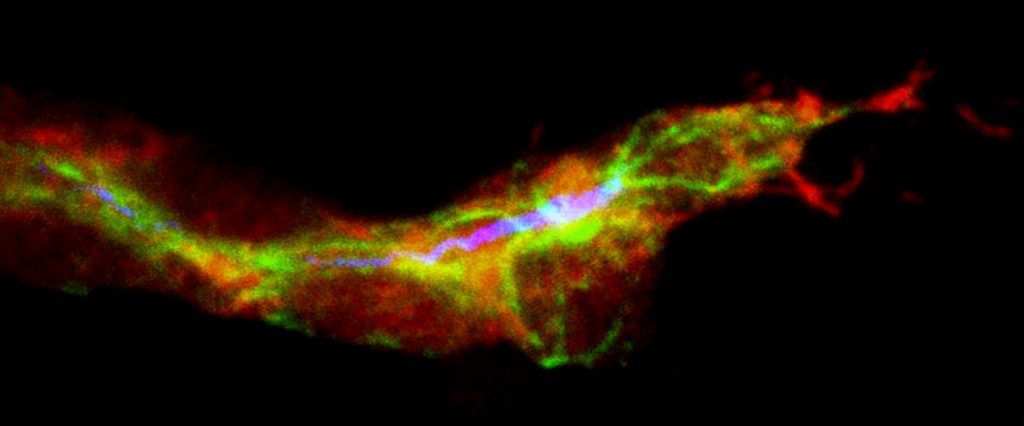Irvine, Calif., April 7, 2016 — While stem cells have shown promise for treating brain regions damaged by cancer radiation treatments, University of California, Irvine researchers have found that microscopic vesicles isolated from these cells provide similar benefits without some of the risks associated with stem cells.
In research with rats, these membrane structures secreted by cells – called microvesicles – transplanted two days after cranial irradiation restored cognitive function, reduced inflammation and protected neurons, as measured in four- and six-week assessments, with no sign of immunorejection or tumor growth – two stem cell-related risk factors. Study results appear this week in the early online edition of Proceedings of the National Academies of Science.
Microvesicles are small, fluid-filled sacs secreted by all human cells. Their plasma contains a range of bioactive cargo (proteins, RNAs, etc.) that can benefit cellular physiology. In the brain, they help regulate the health and functionality of neurons. Microvesicles also can play an important role in tissue regeneration.
For the UCI research, Charles Limoli, professor of radiation oncology, and colleagues isolated and removed microvesicles secreted by multipotent human neural stem cells. Through a series of injections in areas above the hippocampus – a region known for the growth of new neurons – microvesicles were transplanted into the brains of rats that had undergone radiation treatment. Each injection contained 2 microliters of microvesicles.
Starting one month after irradiation, the rodents receiving microvesicle injections showed significant improvements in cognition as gauged by four independent behavioral tasks. Limoli said these cognitive benefits were associated with considerable reductions in neuroinflammation and the preservation of neuronal structures – both classic signs that radiation injury in the brain was either prevented or reversed.
Limoli reported similar results from a 2011 study in which multipotent human neural stem cells were used. However, stem cells may present certain risks, such as rejection by the body’s immune system, altering the growth of existing tumors or forming into teratomas – conditions that are less problematic with microvesicles.
“The appeal of strategies using microvesicles instead of stem cells is that they eliminate any concerns for teratoma formation and substantially minimize side effects associated with immunorejection,” Limoli said.
Radiotherapy for brain tumors is limited by how well the surrounding tissue tolerates it. Patients receiving radiation at effective levels suffer varying degrees of learning and memory loss that can adversely affect their quality of life.
“In almost every instance, people experience severe cognitive impairment that’s progressive and debilitating,” Limoli said. “Pediatric cancer patients can experience a drop of up to three IQ points per year.”
He added that further work is needed to identify the specific factors within microvesicles that are responsible for the neuroprotective effects and to determine how long these beneficial effects persist.
###
Janet Baulch, Munjal Acharya, Barrett Allen, Ning Ru, Nicole Chmielewski, Erich Giedzinski, Amber Syage, Audrey Park, Sarah Benke and Vipan Parihar of the UCI Department of Radiation Oncology in the School of Medicine contributed to the study. The work received support from the Defense Threat Reduction Agency, the American Cancer Society, NASA, the National Institutes of Health and the UCI Institute for Clinical & Translational Science.
About the University of California, Irvine: Currently celebrating its 50th anniversary, UCI is the youngest member of the prestigious Association of American Universities. The campus has produced three Nobel laureates and is known for its academic achievement, premier research, innovation and anteater mascot. Led by Chancellor Howard Gillman, UCI has more than 30,000 students and offers 192 degree programs. It’s located in one of the world’s safest and most economically vibrant communities and is Orange County’s second-largest employer, contributing $4.8 billion annually to the local economy. For more on UCI, visit http://www.uci.edu.
Media access: Radio programs/stations may, for a fee, use an on-campus ISDN line to interview UC Irvine faculty and experts, subject to availability and university approval. For more UC Irvine news, visit news.uci.edu. Additional resources for journalists may be found at communications.uci.edu/for-journalists.
Media Contact
Tom Vasich
[email protected]
949-824-6455
@UCIrvine
http://www.uci.edu
The post UCI study finds safer stem cell-derived therapy for brain radiation recovery appeared first on Scienmag.




